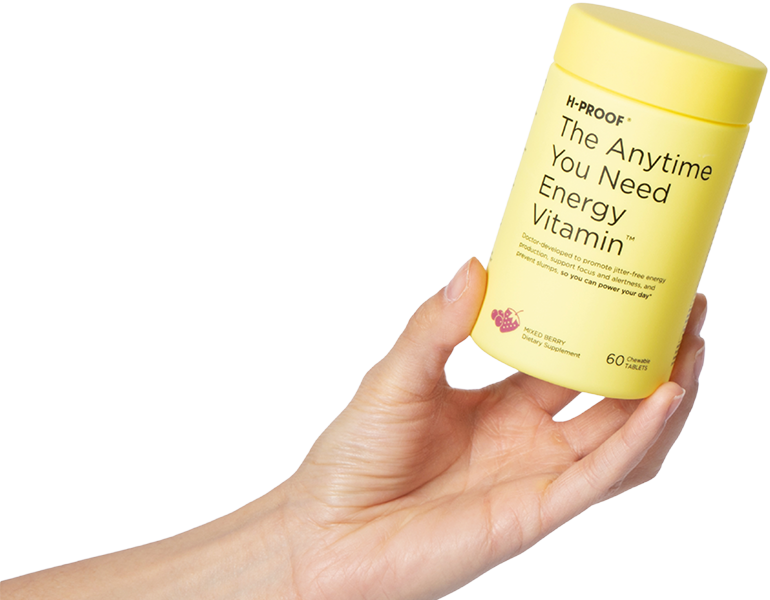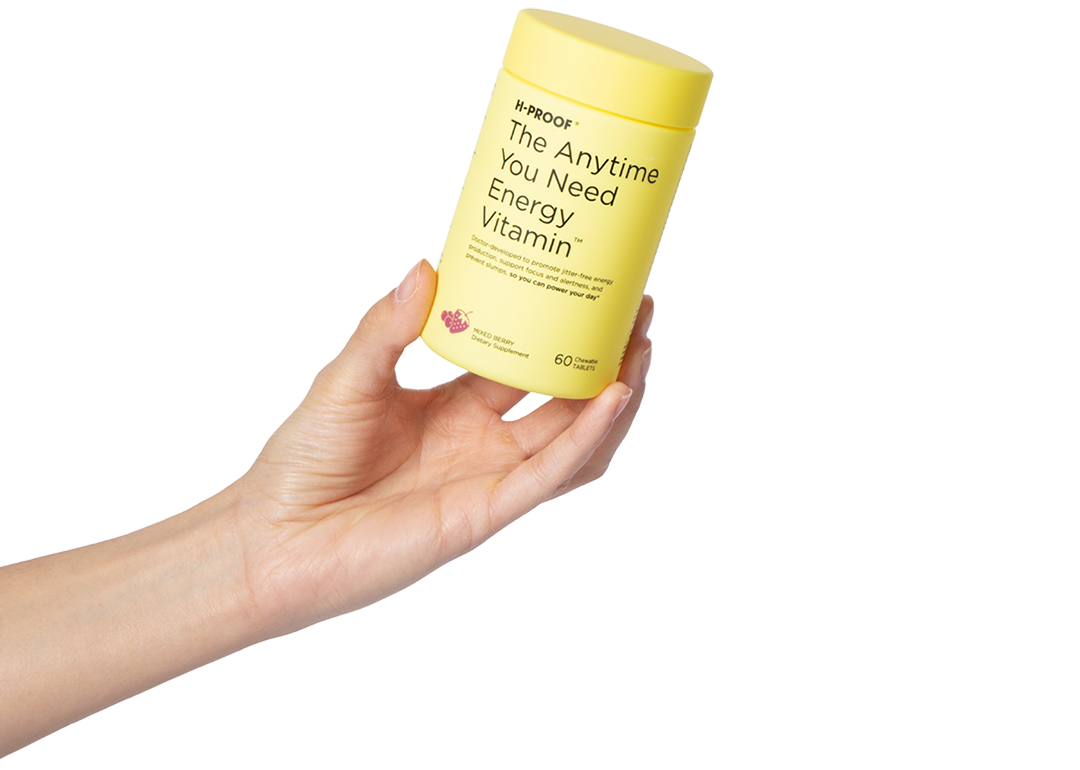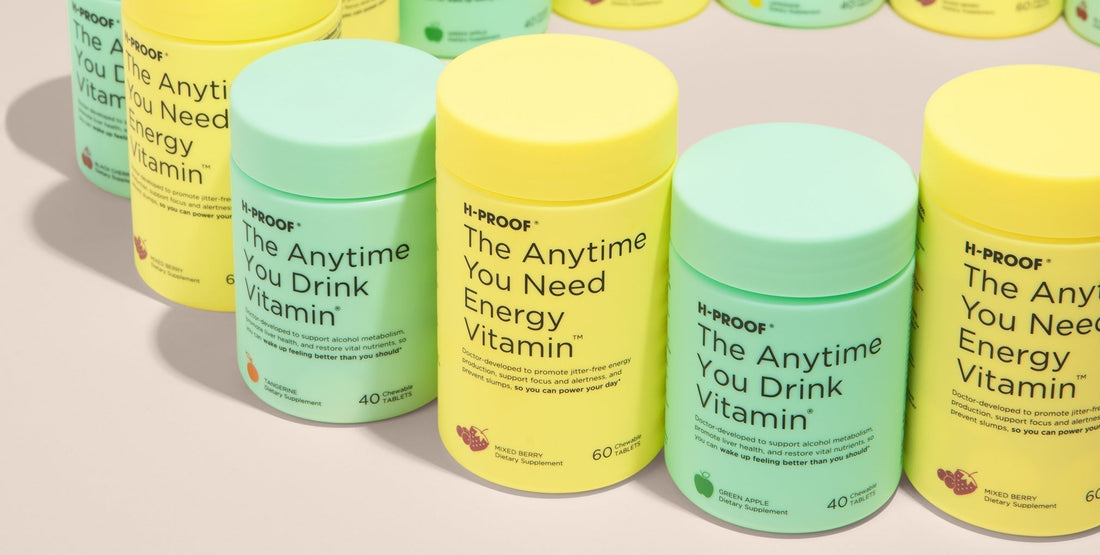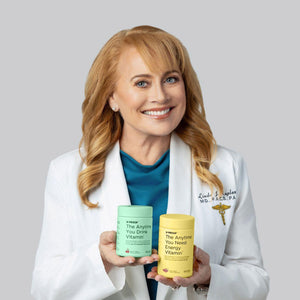At H-PROOF, every formulation is developed by a board-certified medical doctor and built on science—not trends. Each ingredient in our Anytime You Drink Vitamin and Anytime You Need Energy Vitamin is carefully selected and combined in synergistic blends designed to work together for maximum impact. The result? Vitamins with benefits you can actually feel.


The Anytime You Drink Vitamin®
A doctor-developed chewable that supports alcohol metabolism, promotes liver health, and helps you wake up feeling better than you should.*
Shop The Anytime You Drink Vitamin®The Anytime You Drink Vitamin Ingredients
Vitamins
Vitamin C (Ascorbic Acid)
What it is and why we include it: Vitamin C is a water-soluble vitamin that our bodies need but can't make on their own — so we must get it from food or supplements. It acts as a powerful antioxidant and is essential for multiple biological functions including collagen production and immune support.1
Research suggests that supplementing with vitamin C can help the body reduce inflammation and stress markers while enhancing its natural antioxidant defenses.2
Vitamin E (as D-Alpha Tocopheryl Succinate)
What it is and why we include it: Vitamin E refers to a family of fat‑soluble antioxidants, of which α‑tocopherol is the most biologically active and essential for human health — it helps protect cell membranes from oxidative damage caused by free radicals.3
D‑Alpha Tocopheryl Succinate is a stable form of α‑tocopherol.4 And emerging research suggests that this particular form of vitamin E maye have unique and positive biological effects.5
Thiamin (Thiamin HCl)
What it is and why we include it: Thiamin aka vitamin B1 is a water-soluble vitamin that our bodies need but can't make on their own — so we must get it from food or supplements. It helps enzymes turn carbohydrates into energy and build important molecules for brain and body function.6
Research suggests that alcohol contributes to thiamine deficiency by lowering nutrient intake, blocking absorption in the gut, and interfering with how cells use it.7
Riboflavin
What it is and why we include it: Riboflavin aka vitamin B2 is a water-soluble vitamin that our bodies can’t store — so we must get a regular supply from food or supplements. It is an essential component of two major coenzymes that play major roles in energy production and cellular function.8
Research suggests that alcohol can impact the ability to maintain optimal riboflavin levels.9
Niacin
What it is and why we include it: Niacin aka vitamin B3 is a water-soluble vitamin essential for life. It is converted into the coenzyme NAD, which is crucial for cellular energy and metabolic processes. The body can convert tryptophan into niacin, but this is not efficient enough to rely on alone — so we must get it from food or supplements.10
Research suggests that if your diet lacks niacin, alcohol could exacerbate the deficiency.11
Vitamin B6 (as Pyridoxal-5-Phosphate)
What it is and why we include it: P5P aka PLP is the active coenzyme form of vitamin B6, and is water-soluble. It performs a wide variety of functions in the body and is extremely versatile, including supporting hundreds of enzyme reactions.12
Research suggests that alcohol can not only deplete PLP, but also directly damage how the liver makes and uses it, leaving our bodies short on this essential nutrient.13
Folate (as L-5-Methyltetrahydrofolate Calcium)
What it is and why we include it: Folate aka vitamin B9 refers to a group of compounds vital for DNA and RNA synthesis, cell division, and general growth and development. L-5-Methyltetrahydrofolate is the active, ready-to-use form of folate and is more effective for people with MTHFR polymorphism, which impairs folic acid conversion.14
Research suggests that supplementing with folate and vitamin B12 may help protect the liver from alcohol-related damage by lowering harmful homocysteine levels and reducing scarring.15
Vitamin B12 (as Methylcobalamin)
What it is and why we include it: Vitamin B12 is an essential water-soluble vitamin that supports red blood cell formation, DNA synthesis, and neurological function. Methylcobalamin is a biologically active form of vitamin B12.16
Research suggests that supplementing with folate and vitamin B12 may help protect the liver from alcohol-related damage by lowering harmful homocysteine levels and reducing scarring.15
Pantothenic Acid (as Calcium-D-Pantothenate)
What it is and why we include it: Pantothenic acid aka vitamin B5 is a water-soluble vitamin essential for life. It’s a building block for coenzyme A (CoA) and acyl carrier protein (ACP), which are vital players in energy metabolism.Calcium-D-Pantothenate is a stable form that is shelf-stable and easily absorbed.17
Research suggests that if your diet lacks vitamin B5, alcohol could exacerbate the deficiency.11
Minerals
Magnesium (as Magnesium Glycinate)
What it is and why we include it: Magnesium is a vital mineral involved in over 300 biochemical processes, including energy production, nerve and muscle function, and DNA synthesis. Magnesium glycinate (also called magnesium diglycinate or bisglycinate) is a chelated form of magnesium, where the mineral is bound to the amino acid glycine. This form is known for its high absorption rate and gentle effect on digestion.18
Zinc (as Zinc Bisglycinate Chelate)
What it is and why we include it: Zinc is a trace mineral involved in hundreds of enzymatic and biological processes from immune function to DNA repair and hormone regulation. Zinc bisglycinate (also called zinc glycinate or bisglycinate chelate) is a chelated form of zinc, where it is bound to two glycine molecules (an amino acid). This unique structure helps it be absorbed more efficiently and gently by the body.19
Research suggests that zinc may help lower inflammation and oxidative stress.20
Potassium (as Potassium Citrate)
What it is and why we include it: Potassium is an essential electrolyte that plays a vital role in nerve signals, muscle contractions, hydration, and maintaining our bodies’ acid-base balance.21
Proprietary Liver Support Blend
Silymarin (from Milk Thistle Seed Extract)
What it is and why we include it: Silymarin is the active compound extracted from the seeds of the milk thistle plant (Silybum marianum), a herb with a long history of being used to support liver health. It’s not a single molecule, but a complex mixture.22
Research suggests that Silymarin helps protect the liver from alcohol-related damage.23
Taurine
What it is and why we include it: Taurine is an amino acid that isn’t used to build proteins, like most amino acids, but is vital for other body functions.24
Research suggests that Taurine accelerates activity of aldehyde dehydrogenase, one of the liver enzymes that is part of the alcohol metabolic pathway.25
Dihydromyricetin (DHM)
What it is and why we include it: Dihydromyricetin (DHM) aka ampelopsin, is a natural flavonoid (a type of plant compound) found primarily in the vine tea plant (Ampelopsis grossedentata) and the Japanese raisin tree (Hovenia dulcis). It has a long history in traditional Asian medicine for liver support.26
Research suggests that DHM may promote liver health by reducing fat buildup, improving alcohol metabolism, accelerating the breakdown of acetaldehyde, and calming inflammation.27
L-Glutathione
What it is and why we include it: Glutathione is an abundant tripeptide that directly neutralizes harmful by-products and powers enzymes that turn peroxides and toxins into safer compounds.. It also helps recharge other antioxidants like vitamins C and E so the whole defense system keeps working. In short, it’s the hub that cleans up damage, supports detox, and keeps the rest of the antioxidant team active. Our bodies constantly recycle it.28
Research suggests that glutathione may lower acetaldehyde levels.29
Learn about l-glutathione vs l-glutamine in our blog.
Inactive Ingredients (Excipients & Sweeteners)
On their own, actives like certain B-vitamins and amino acids don’t taste great and don’t hold together nicely. Our inactive ingredients help transform our powerful active ingredients into tasty, convenient chewables you’ll reach for anytime you drink.
Excipients are “helper” ingredients—think binders, disintegrants, and texture agents—that turn a pile of potent raw nutrients into a consistent, stable, easy-to-chew tablet.
A small amount of sweeteners and natural flavors help mask bitterness and give our doctor-developed formula an enjoyable taste—so you’ll actually want to take it.
Sorbitol
What it is and why we include it: Sorbitol is a sweet, sugar-free excipient. It has a lower glycemic impact than sugar.30
Crospovidone
What it is and why we include it: Crospovidone helps tablets break apart quickly so the active ingredients dissolve and can be absorbed. It works mainly by wicking water into the tablet, speeding disintegration, and is especially important for chewables.31
Stearic Acid
What it is and why we include it: Stearic acid is a long-chain saturated fatty acid used in manufacturing to prevent dietary supplements from sticking to tooling.32
Microcrystalline Cellulose (MCC)
What it is and why we include it: MCC is a fiber that helps hold tables together during production, and allows them to break up appropriately during consumption.33
Magnesium Stearate
What it is and why we include it: Magnesium stearate is the magnesium salt of stearic acid—a long-chain fatty acid—used in manufacturing to prevent dietary supplements from sticking to tooling.34
Citric Acid
What it is and why we include it: Citric acid is a weak organic acid that makes tablets and powders more palatable, stable, and quick-dissolving.35
Natural Flavor
What it is and why we include it: Natural flavor is flavoring derived from natural sources (e.g., fruits, vegetables, spices) used to enhance taste.36
Silicon Dioxide
What it is and why we include it: Silicon dioxide is a purified, amorphous form of silica used as an anti-caking agent in foods and dietary supplements.37
Sucralose
What it is and why we include it: Sucralose is a zero calorie sweetener derived from sugar used to sweeten and enhance taste.38


The Anytime You Need Energy Vitamin®
A science-backed chewable that delivers jitter-free energy, sharpens focus and alertness, and stops slumps so you can power your day.*
Shop The Anytime You Need Energy Vitamin®The Anytime You Need Energy Vitamin Ingredients
Vitamins
Vitamin C (Ascorbic Acid)
What it is and why we include it: Vitamin C is a water-soluble vitamin that our bodies need but can't make on their own — so we must get it from food or supplements. It acts as a powerful antioxidant and is essential for multiple biological functions including collagen production and immune support.1
Research suggests that supplementing with vitamin C can help people feel more motivated, stay focused longer, and do better on tasks that require steady attention.39
Thiamin (Thiamin HCl)
What it is and why we include it: Thiamin aka vitamin B1 is part of your body’s core “production line,” helping make the raw materials for brain and cell health—fats and steroids for membranes, DNA/RNA for renewal, and the precursors to key neurotransmitters.
Beyond energy, it also helps fine-tune the acetylcholine signaling system, which supports attention and memory. And it contributes to sturdy, well-functioning cell membranes in neurons and their support cells, so brain communication stays efficient.40
Riboflavin
What it is and why we include it: Riboflavin aka vitamin B2 turns into FMN and FAD—the coenzymes that “switch on” many energy enzymes so your cells convert fuel efficiently. It also boosts the whole B-complex by helping make and recycle niacin, folate, and B6, and it’s required to build heme and other proteins that move and use oxygen.
Riboflavin supports metabolism and focus by aiding brain lipid metabolism, iron absorption, and healthy thyroid hormone activity. Finally, it powers your antioxidant defenses via the glutathione system—helping you feel steady, not depleted.40
Niacin
What it is and why we include it: Niacin aka vitamin B3 is the raw material for NAD/NADP—the molecules that power your cells’ energy engines. Beyond ATP production, niacin supports antioxidant defenses, DNA repair, and cell signaling, and it enables folate to do its job. It also activates niacin receptors in the brain, immune system, and fat tissue, helping regulate inflammation and healthy fat metabolism.
Vitamin B3 keeps energy production efficient while supporting recovery and metabolic balance—so you feel steady, not wired.40
Vitamin B6 (as Pyridoxal-5-Phosphate)
What it is and why we include it: P5P aka PLP is the co-pilot for making key neurotransmitters—dopamine, serotonin, GABA, norepinephrine—and melatonin, which drive mood, focus, calm, and sleep. Even mild vitamin B6 shortfalls preferentially lower serotonin and GABA, removing the brain’s natural “brakes” and contributing to restless sleep, jittery behavior, and cardiovascular strain.
Vitamin B6 also supports the folate cycle, brain glucose use, and healthy immune and gene regulation. Because PLP levels fall during inflammation, steady vitamin B6 helps keep energy, cognition, and stress responses on track.40
Vitamin B12 (as Methylcobalamin)
What it is and why we include it: Vitamin B12 is fundamental to steady energy: it helps your body convert food into fuel, builds healthy red blood cells, supports nerve function, and even helps make DNA.41
Pantothenic Acid (as Calcium-D-Pantothenate)
What it is and why we include it: Pantothenic acid aka vitamin B5 becomes coenzyme A—the master key that unlocks your cells’ energy production. CoA also builds the “hardware” of brain cells by helping make cholesterol, phospholipids, amino acids, and fatty acids. Through CoA, vitamin B5 supports the creation of neurotransmitters and steroid hormones that influence focus, stress resilience, and recovery. The net effect is more efficient energy plus steadier cognitive and metabolic performance.40
Minerals
Calcium (as Calcium Pyruvate)
What it is and why we include it: Calcium pyruvate is the calcium salt of pyruvic acid. Glycolysis—the first stage of glucose breakdown—produces pyruvate. Under aerobic conditions, pyruvate is moved into mitochondria and converted to acetyl-CoA, which then feeds the Krebs cycle, linking these energy-producing processes.42
Other Active Ingredients
Choline (as Citicoline Sodium [CDP-Choline Sodium]) / Citicoline (Cytidine Diphosphate—CDP) / Choline Sodium
What it is and why we include it: Choline is a water-soluble nutrient often grouped with B vitamins. It is an essential building block our cells use to keep their membranes—and mitochondria—strong, and it helps make acetylcholine, the neurotransmitter tied to focus and mental drive.43
Choline is listed on our supplement facts panel in three ways due to FDA labeling requirements. We utilize a stable and highly bioavailable form of choline that our bodies readily convert into choline and uridine, which fuel membrane renewal and healthy brain signaling.44
Caffeine (from Microencapsulated Caffeine)
What it is and why we include it: Caffeine is a naturally occurring central nervous system stimulant. It keeps us alert mainly by blocking adenosine receptors in the brain (A1/A2A), which reduces sleepiness and increases wakefulness.45 Encapsulating caffeine markedly reduces bitterness and improves taste.
Research suggests there are significant benefits to caffeine beyond increasing wakefulness, including:
- Boosting alertness, reaction time, and the ability to encode new information. 46
- Heightening activity in brain regions tied to executive attention during working memory. 47
- Improving auditory vigilance and visual reaction time. 48
- Increasing energy availability and expenditure; reducing fatigue and perceived effort; improving physical and motor performance; sharper focus and sustained attention; better short-term memory, reasoning, and decision-making; and enhanced overall cognitive function and neuromuscular coordination. 49
L-Tyrosine
What it is and why we include it: L-Tyrosine is an amino acid our bodies use to build proteins and is a key precursor for the neurotransmitters dopamine, norepinephrine, epinephrine, the thyroid hormones T₃/T₄, and melanin.50
Research suggests l-tyrosine may help reduce stress.51
Inactive Ingredients (Excipients & Sweeteners)
On their own, actives like certain B-vitamins and amino acids don’t taste great and don’t hold together nicely. Our inactive ingredients help transform our powerful active ingredients into tasty, convenient chewables you’ll reach for anytime you need energy.
Excipients are “helper” ingredients—think binders, disintegrants, and texture agents—that turn a pile of potent raw nutrients into a consistent, stable, easy-to-chew tablet.
A small amount of sweeteners and natural flavors help mask bitterness and give our doctor-developed formula an enjoyable taste—so you’ll actually want to take it.
Sorbitol
What it is and why we include it: Sorbitol is a sweet, sugar-free excipient. It has a lower glycemic impact than sugar.30
Vegetable Oil
What it is and why we include it: Vegetable oil is oil pressed from plants used as a manufacturing excipient.52
Microcrystalline Cellulose (MCC)
What it is and why we include it: MCC is a fiber that helps hold tables together during production, and allows them to break up appropriately during consumption.33
Stearic Acid
What it is and why we include it: Stearic acid is a long-chain saturated fatty acid used in manufacturing to prevent dietary supplements from sticking to tooling.32
Natural Flavors
What it is and why we include it: Natural flavor is flavoring derived from natural sources (e.g., fruits, vegetables, spices) used to enhance taste.36
Magnesium Stearate
What it is and why we include it: Magnesium stearate is the magnesium salt of stearic acid—a long-chain fatty acid—used in manufacturing to prevent dietary supplements from sticking to tooling.34
Citric Acid
What it is and why we include it: Citric acid is a weak organic acid that makes tablets and powders more palatable, stable, and quick-dissolving.35
Silicon Dioxide
What it is and why we include it: Silicon dioxide is a purified, amorphous form of silica used as an anti-caking agent in foods and dietary supplements.37
Sucralose
What it is and why we include it: Sucralose is a zero calorie sweetener derived from sugar used to sweeten and enhance taste.38
Rebaudioside A (from Stevia Leaf Extract)
What it is and why we include it: Rebaudioside is a zero calorie sweetener derived from the leaves of the Stevia rebaudiana plant used to sweeten and enhance taste.53

H-PROOF: Doctor-Developed Vitamins with Benefits You’ll Feel
From liver support and antioxidant defense to clean, focused energy, our doctor-developed blends are purpose-built to help you feel your best—without the jitters or the guesswork. We obsess over forms, doses, and synergy so every chewable delivers real-world results you can feel.
This article is for informational purposes only and is not intended to be a substitute for professional medical advice.


